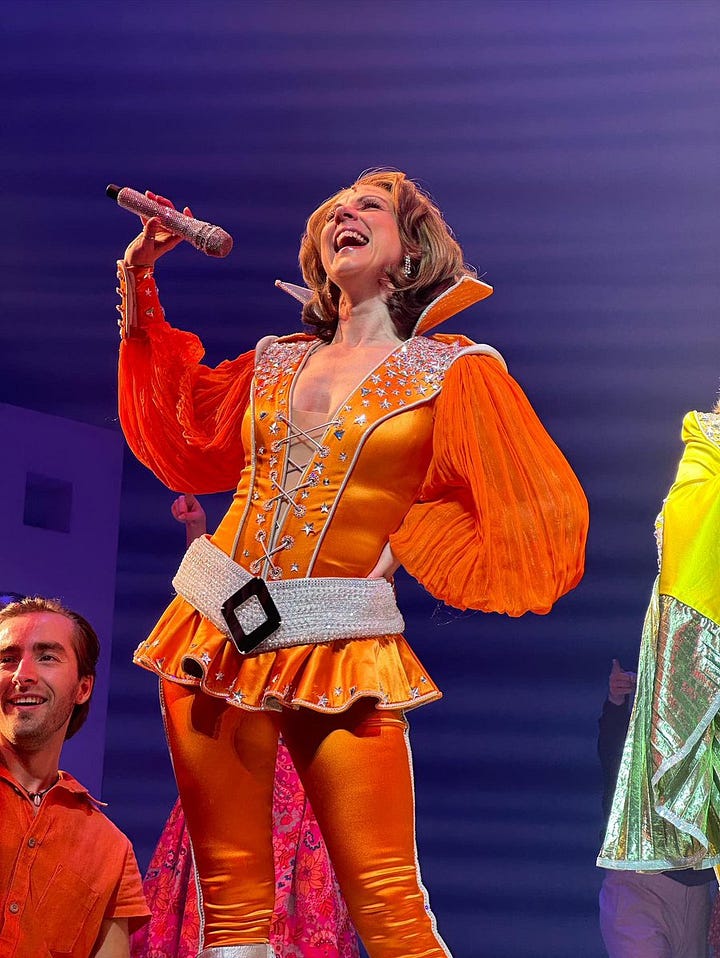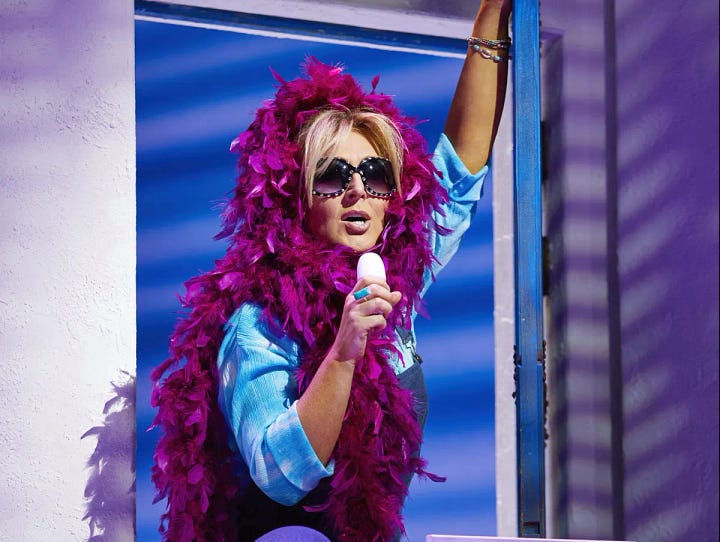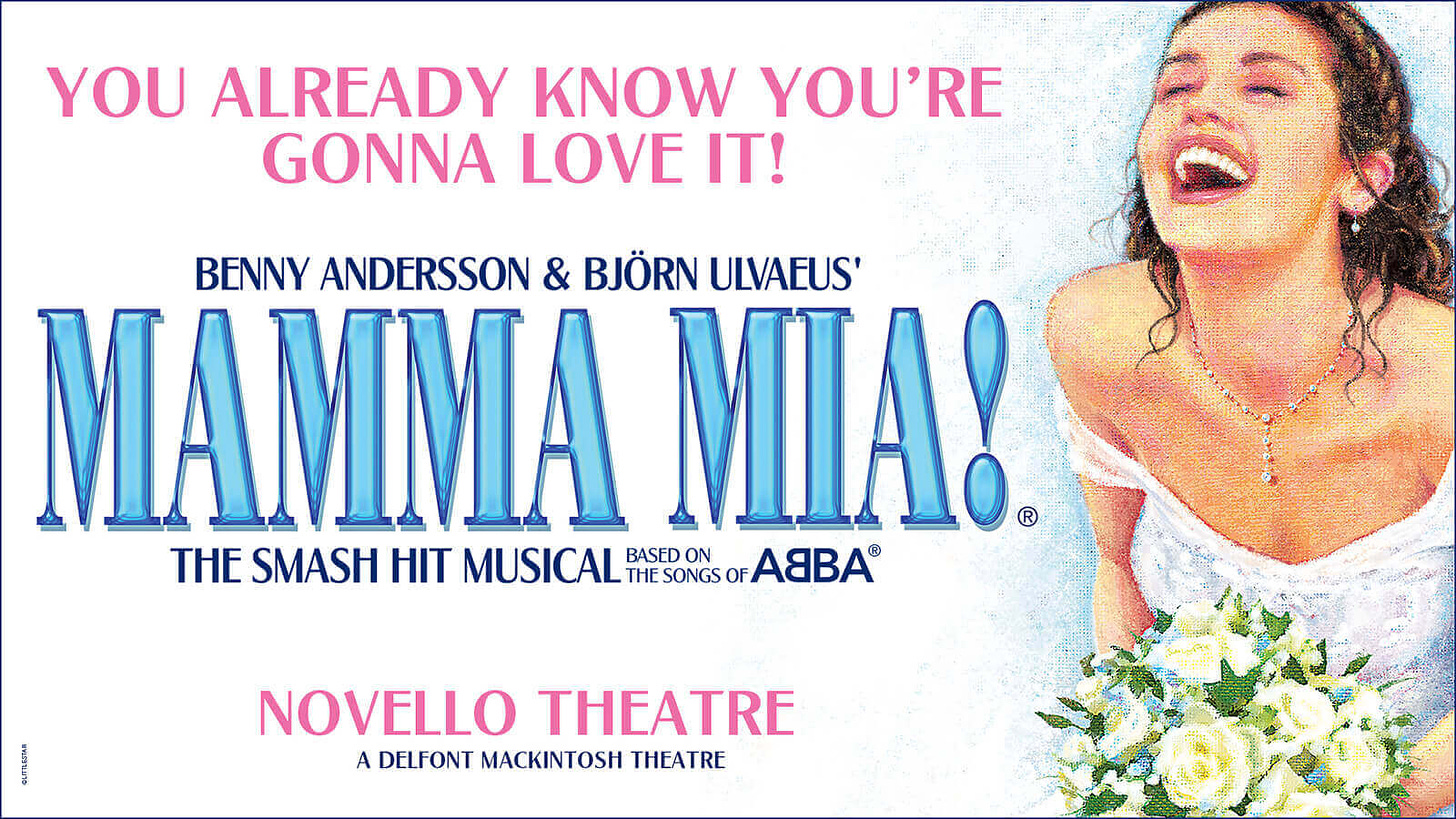Why Does Mamma Mia Make Us Feel So Good?
Brilliant Songs, Acceptance and An Incredible Cast All Help!
Thanks for checking out the Jason Ward Creative Substack. I hope you enjoy this piece that looks at the incredible success of the show / movie / dinner experience that is Mamma Mia. If you want to support my work I would love to welcome you to the JasonWard Creative Substack community where subscription is currently free. Your subscription would mean so much and help to support my work. Enjoy the article and use this button to subscribe
How do you make a jukebox musical? Take a bunch of hit pop songs, string them together with a gossamer thread of a story and voila’ you have a feel good jukebox show that will make you millions around the world! Right? Not really. It’s only when you see a really good jukebox musical that you realise how difficult it is.
And I just saw a wonderful show that happens to be a jukebox musical. Being a bit of a musical theatre snob, I have avoided Mamma Mia for the last 24 years. This is not because of the music by Abba which I like. No, the reason I avoided Mamma Mia is because it is so often described as a “feel good” show. In the snobby part of my mind this translated to ‘Hen Night Drunken Screaming to Dancing Queen’. So while it’s true that the audience at the Novello Theatre last week appeared to be mainly female identifying, who was that person on their feet screaming their tits off to Dancing Queen at the end? Yep! It was serious minded, middle aged and male - me!! And do you know why? Because I felt good.
Mamma Mia the Musical has been running in London for 24 years, and has been seen by 65 million people worldwide, earning more than $4billion. It was the first new show to open on Broadway after 9/11 and the first show to re-open in London after the pandemic. This show makes a lot of people feel good in a way that goes beyond giddily singing along to Gimme Gimme Gimme!
The experience has made me think about why and how Mamma Mia makes you feel good? I think a big part of it’s success is because the show deals with the conditional - much like the songs it is draws inspiration from. There is the idea of love and uncertainty, of making a mistake and being forgiven, and of being human. A state where love is never the totally engulfing many splendoured thing but something that has rough edges and tough times. Most of all Mamma Mia has a theme of acceptance - of both ourselves and others.
The lead character, Donna, doesn’t know which of the three guys she slept with 20 years ago is the father of her daughter. The show is not judging her because we’re all human and she actually does a really good job of judging herself! We’ve probably all had one night stands or whatever and maybe we felt a bit guilty about them? But Mamma Mia, through Donna’s journey, forgives her, forgives us and lets us forgive ourselves too.
While Donna beats herself up about her hot girl summer, her daughter, Sophie, is excited to discover from reading Donna’s diary that her own origin story has three different possibilities. Sophie invites all three of the men who could be her father to her wedding because she thinks it will be clear when she meets them which is her dad. She asks them to arrive the day before the ceremony. Sophie’s actions give the show a want, a conflict that we can see coming but the lead character cannot AND a countdown all triggered in the first ten minutes of act one - this is classic musical theatre!
Women are judged more harshly than men in pretty much every part of life and especially when it comes to sex and relationships. And the guilt women have been made to feel about sex can hang around forever like cigarette smoke in upholstery. Mamma Mia is a show about women who have all experienced sex and relationships in different ways and we learn more about this when we meet Donna’s two best friends and former cast mates in singing group Donna and the Dynamos. There is the vampy and thrice married Tanya and Rosie who is intentionally unmarried but not unpassionate!
Donna’s guilt about her own behaviour manifests as an insatiable drive to build something: in this case a Taverna on a Greek island and a future for her daughter Sophie. We discover later on that a big part of Donna’s guilt, and her desire to be everything for Sophie, stems from how her own mother disowned her for becoming a single mother. Quick note for younger readers: Once upon a time and not so long ago, single mothers were regarded as being enemies of the state. Young women were vilified in the right wing press, expelled from school and generally treated like an inconvenient piece of something nasty stuck to the sole of society’s shoe. All of this feeds into Donna’s drive to be the best mother she can for Sophie and her conviction that she was treated badly. She is scared to tell her daughter the truth so she has built a kind of protective myth around herself. This comes crumbling down when Sophie discovers the truth and is actually intrigued and excited rather than shocked and horrified. Donna has projected her mother’s beliefs onto what she thought her daughter might think but in reality Sophie offers acceptance.
Now it is Donna’s turn to accept her daughter’s maturity and independence. Donna has been fiercely single all of her adult life claiming to not need a ‘middle aged, menopausal man’ hanging around her. She does not understand why her daughter wants a big white wedding instead of remaining unencumbered. It is generational conflict inverted - again very clever and emotionally engaging.
Mamma Mia is subversive on many levels as characters work through issues with casual sex, divorce, older woman/younger guy hook ups, gay parents and single parenthood. All these subjects are treated in a grown up way as part of everyday life - again it is acceptance that we are human.
It was the music of Abba that inspired this show. The songs juxtapose joyful melodies and a happy pop feel with layers of lyrical melancholy and uncertainty Nothing is just surface in these songs; yes she’s a Dancing Queen but only when she gets the chance, when the conditions are right on a Friday night when the lights are low. Love is painful - ‘I wasn’t jealous until we met’ and “I was sick and tired of everything when I called you last night from Glasgow…” Talk about dismantling the glittering exterior - yes I’ll be smiling outwardly but inside I’m dying of loneliness. When we get to ‘The Winner Takes It All’ (which is the greatest 11 o’clock song ever written) we realise that these are clever, multi-layered songs that so obviously belong in a musical - we are also weeping uncontrollably and ready for the unexpected but very happy ending we are about to get served!
The cast I saw were extraordinary even with 3 of the 7 principal roles being covered by incredible understudies. The ensemble was sharp and hot and in the act one finale I saw one of the best back bends I have ever seen onstage!
Frankie Jones covering Sophie literally shone throughout as she grew from a girl who had a bright idea into a woman who was able to accept and embrace her ‘differentness’ and take her own path of discovery. Fellow cover Gemma Atkins perfectly balanced the outward Cougar confidence of Tanya with the vulnerability that can arrive with age - and she killed Does Your Mother Know! Michael Storrs stepping in to the Bill track gave us full on swaggering Ray Mears, afraid of nothing except Rosie’s advances in Take A Chance On Me - brilliantly played by Gemma Goggin. The emotional heart of this show is Donna played by Mazz Murray who inhabits, drives and dazzles in the role. Her powerful charisma makes it easy to understand why her three ex-lovers still think the world of Donna. Vocally, she gives us the delicate and touching in Slipping Through My Fingers, a huge emotional release in Winner Takes It All and full on party singer in the show’s finale. All the way through Ms Murray makes you feel like you know Donna, that she is every woman (and man) in the audience, that she gets you. She makes us see that if we can accept Donna’s flaws and still love her then we can accept our own flaws too.
It is this truth in Mamma Mia that makes it the greatest feel good show ever.


If you liked this article then check out this review of brand new musical The Curious Case of Benjamin Button which I saw at the Southwark Playhouse, Elephant. The show is by one of my favourite musical theatre composer, Darren Clark and is currently going through further creative development before a return to the stage.
The Curious Case Of Benjamin Button - A New Musical REVIEW
Thanks for reading The Jason Ward Creative Substack! Subscribe for free to receive new posts and support my work. PLEASE NOTE THIS REVIEW IS OF A PREVIEW PERFORMANCE Booking tickets for new musical The Curious Case of Benjamin Button at Southwark Playhouse, Elephant was an obvious choice. The show promises so many elements that I love: it is new work, it …








You nailed the critique of this amazing show and took me back to the roller coaster of emotions that it evokes. Thank you!